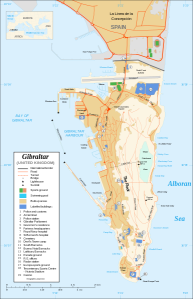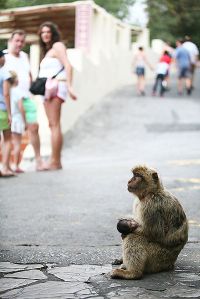Part 2 of the British Overseas Territories series looking at Britain’s remaining territory in Europe; Gibraltar
Population:
- 29,752 (Roughly a tenth of the population of Bradford, England)
One of the quirks of Europe is that much of European territory is scattered around the region. The Danes control the Faroe Islands, far north of the Scottish coastline, Russia controls an enclave (Kaliningrad) west of Lithuania, Spain controls enclaves on the North African border and Britain controls Gibraltar on the Spanish coast.
This small patch of Britain, which measures only 6.8 sq/km, has been an official British territory since 1713 and a constant thorn in relations between the Spanish and British governments.
Gibraltar is one of the most strategic points in the Mediterranean, lying on a peninsula off the Spanish coast. From here whoever controls the territory can exercise great control over movement to and from the Mediterranean Sea. This has characterised Gibraltar for centuries and was one of the main motivations for Anglo-Dutch forces to take the territory from the Spanish in 1704 during the War of Spanish Succession. Since then Gibraltar has always been used as an important military base for the British, playing important roles in the Battle of Trafalgar and in World War II when the Nazis planned an invasion of Gibraltar, code-named Operation Felix. However without Spanish support the German invasion never occurred, ensuring that Britain’s control of the territory was yet again protected.
The biggest threat in contemporary British control of Gibraltar, comes not from military conflict but from politics. The Spanish government has maintained a claim to the territory and for much of the 20th century the dispute over political ownership has greatly affected relations between Gibraltar, Spain and Britain. The border remained closed for much of General Franco’s reign and even into the 21st century there were still conditions imposed on trade and difficulties to resolve regarding the movement of people across the border.
Like in the Falkland Islands, Britain has maintained that it is the right of the people of Gibraltar to decide their political future and during two referendums on their status the citizens voted strongly against Spanish sovereignty, although within Gibraltar’s politics there is political support in the territory for an increase in Gibraltar’s right to self determination.
Whether or not Britain is right to retain control over this territory in the Mediterranean is debatable, although as Britain was granted the territory during the Treaty of Utrecht legally it is British. What is clear for politician in Britain whilst Gibraltar remains loyal to Britain, Britain will support the right for Gibraltar to remain a British overseas territory.
The territory hasn’t been completely hampered by these political disputes. As an important British naval port the territory has continued to thrive with a continual population present in the region. This population has caused a rapid development of industry in recent years, including financial services, shipping and tourism. These industries have benefited from a preferential business environment and the opening up of Gibraltar following the abandonment of Spain’s blockades.
Today tourism is one of the biggest industries, with thousands of tourists coming into the territory to visit the Rock of Gibraltar, the natural landmark that dominates the area, and to see the only wild monkeys found in Europe, the Barbary Macaques. Combined with being a major stopover point for cruise ships, Gibraltar has become the perfect package for tourists.
However it is the culture of Gibraltar that is arguably the biggest draw for visitors. It is a well known fact that the Costa del Sol and the wider region is a popular destination for British tourists and Gibraltar, being a British territory, offers a slice of British culture in Southern Spain. It is a territory that speaks English, has British retail brands and yet still retains the Spanish climate, cuisine and lifestyle that visitors have come to enjoy in Spain. In addition to the British and Spanish cultural mix, Gibraltar is known as a territory with a mix of ethnic backgrounds. Due to Malta’s prior role as a British colony there is a significant Maltese population in the territory and alongside that there are also populations of Genoese, Italians, Portuguese and Jewish people. This has created an endemic culture in Gibraltar, one that is a unique mix of cultural background and cultural traditions.
This mix continues to draw in visitors to Gibraltar, but it is the overtly British nature of the territory that characterises Gibraltar. Alongside the flag of Gibraltar the Union Jack flies in Southern Spain and the people of Gibraltar remain loyal to and proud of the British Royal family. Post boxes are red, and although they drive on the right hand side of the road it is clear that Gibraltar is British and proud to remain Britain’s last remaining colony in Europe.





